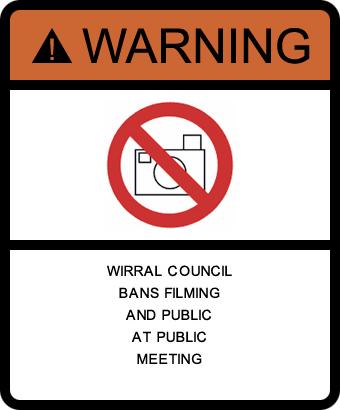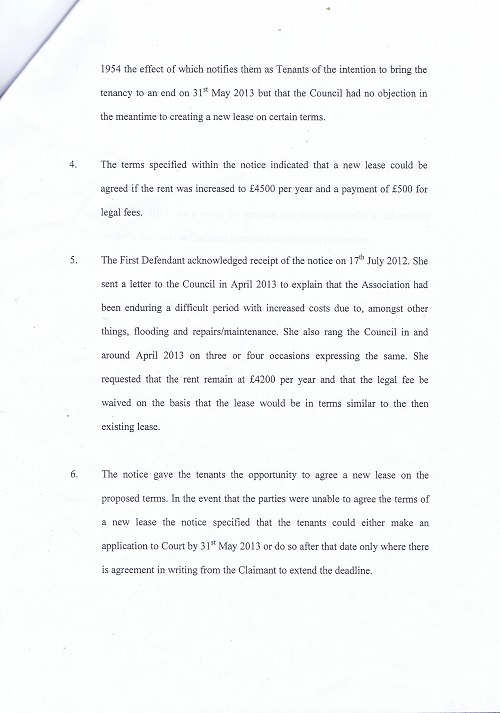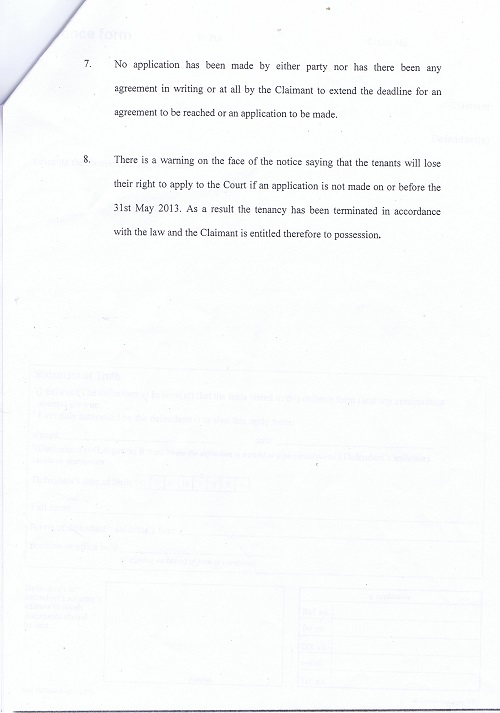A letter to all 66 councillors at Wirral Council on press freedom and censorship

A picture reminder above of times gone by at Wirral Council
Below is a communication I will be emailing to those listed below later.
Dear Surjit Tour,
councillors
senior management team (Wirral Council)
Rt Hon Frank Field MP
I am publishing this response which relates to a dispute between myself and Wirral Council.
I believe there should be openness and transparency when it comes to public bodies and the press.
I will firstly deal with the recent Youth and Play Service Advisory Committee meeting. Prior to the meeting, as some councillors and officers will already be aware the meeting was delayed starting because of the filming issue. As it was the first public meeting of the Youth and Play Service Advisory Committee since August 6th (which officially consists just of councillors) I was willing to accede to a request on this occasion and pointed out I was not setting a precedent.
Since that I have also filmed (last week) a public meeting of the Birkenhead Constituency Committee at which four young people spoke, along with a youth worker during that public meeting. There were no objections, before, during or after this meeting about me filming it. Nothing has been brought to my attention about this.
Earlier this year (on August 6th) the Openness of Local Government Bodies Regulations 2014, which can be read at http://www.legislation.gov.uk/uksi/2014/2095/contents/made came into effect.
The effect of regulations 3-5 were to amend (and in some cases repeal) legislation about public meetings of bodies in England such as Wirral Council, but also public meetings of other public bodies such as the Merseyside Fire and Rescue Authority and the Liverpool City Region Combined Authority (amongst others).
Regulation 5 only at Wirral Council applies to Cabinet meetings, so I will be referring to regulations 3 and 4.
Regulation 3 alters the Public Bodies (Admission to Meetings) Act 1960 and puts this legal duty on Wirral Council:
“in the case of a meeting of a relevant local government body, while the meeting is open to the public any person attending is to be permitted to report on the meeting.”
For the purposes of clarity Wirral Council is a “relevant local government body”. The definition of newspaper in that legislation is changed to include “in the case of a relevant local government body, for use in electronic or any other format to provide news to the public by means of the internet”.
There is a part added to state (which applies not just to meetings of Council, but also committees and subcommittees):
“(7E) Any person who attends a meeting of a principal council in England for the purpose of reporting on the meeting may use any communication method, including the internet, to publish, post or otherwise share the results of the person’s reporting activities.”
Therefore the law is quite clear on this matter.
On the 2nd December 2013 Council agreed the committee calendar for the 2014/15 Municipal Year. This includes the following entry for November 11th 2014: “COUNCIL (Youth Parliament)”.
The list of attendees is the list of 66 Wirral Council councillors and this meeting has in previous years been chaired by the Mayor. In fact the first item on the agenda is “Mayor’s Announcements”. The agenda frontsheet, which can be read on your website in fact states “Dear councillor
You are hereby summoned to attend a meeting of the Council to be held at 6.15 pm on Tuesday, 11 November 2014 in the Council Chamber, within the Town Hall, Wallasey”.
Therefore by your own words, by your own calendar and own agenda it is a meeting of all 66 councillors, chaired by the Mayor. It is therefore a meeting of a local government body and your arguments about the presence of young people (who like the councillors have been elected by their peers) somehow meaning that it should not be filmed are incorrect and frankly hard to comprehend. How can there be an expectation of privacy at a public meeting?
Wirral Council have no legal power any more to prevent filming at public meetings because the power you had in the past (but have no more) was as has been well documented abused numerous times and that is what led (in part) to the legislation change and repeals of earlier legislation that you relied upon previously. This change came into effect on 6th August 2014.
If Wirral Council carries on like this Wirral Council opens itself up to a legal challenge on ground of illegality, irrationality, proportionality, fairness and because of what happened at the Birkenhead Constituency Committee meeting legitimate expectation. These are also grounds in Wirral Council’s constitution for not engaging in what I perceive as misguided attempts to censor the media.
Wirral Council could also face a claim for human rights damages as the legal argument would be made that as a public body it was breaching s.6(1) of the Human Rights Act 1998, more specifically Article 10 (freedom of expression). As I’m sure you will be aware there is plenty of existing case law upholding the rights of individuals to political speech and against the strong desire of public bodies to suppress views they don’t want the public to hear.
As management, the trade union representative has discussed the matter with me and union rule 1 has been discussed which states “At all times upholds and defends the principle of media freedom, the right of freedom of expression and the right of the public to be informed.”
Therefore that trade union member would be quite within their rights to refuse to work on 11th November and Wirral Council carries on taking such an intransigent attitude, I would be forced to implement industrial relations contingency arrangements. This is therefore becoming an industrial relations matter both internally within this organisation and externally with yours.
I fully expect however based on recent past experience and a conversation I had on November 5th that Labour councillors will neither side with the trade unions or the press on this matter. I fully expect from past experience that it is always awkward particularly for some councillors to be seen to be either promoting trade union interests, good industrial relations, people’s human rights, constitutional decision-making or in fact the public interest.
It is perfectly clear (at least to me) from past decisions made at the political level exactly what Wirral Council’s current policy is on this. These past policy decisions made on this are quite clear that any filming, photography, audio recording or other types of recording (whether during public meetings or not) is unrestricted in Wirral Council buildings. That policy came about because one councillor took a photograph of another councillor eating if I remember correctly a sandwich.
The recent legal change just implements Wirral Council’s existing policy and puts it on a statutory basis with regards to public meetings.
I have had these arguments with Wirral Council over filming for a very, very long time. Wirral Council’s position and the position of various individuals has been made abundantly clear to me over the years. I have been shouted at during public meetings, bullied and treated badly which considering Wallasey Town Hall is also my workplace is not the way for anyone to be treated. I have also seen another member of the press working for a local newspaper mistreated in the same way by a senior politician.
There are many other important matters that we should all be concentrating our collective minds on rather than Wirral Council deliberately picking battles with the press, which do nothing to improve Wirral Council’s tarnished reputation or that of senior officers and councillors.
I am making my position as clear here as I can make it. The only advice I can give you at this stage is to seek external independent legal advice on your position before this matter ends up being independently adjudicated by a court and I suggest you circulate a report on this to all councillors and myself ahead of the 11th November meeting (if it takes place).
Yours sincerely,
John Brace
P.S. The Monitoring Officer comments verbally on November 5th 2014 on my report (without having read it himself) of the YPSAC public meeting and my description of the young person at that meeting. I deplore censorship of any kind and when it relates solely to the political views of an individual in a protected minority with disabilities even more so. Before the meeting was held I advised the Monitoring Officer that he could have advised councillors to exclude the press and public. The Monitoring Officer chose not to advise politicians to do so but instead to advise to adjourn the meeting if I attempted to film, audio record or photograph it.
There was also attempted censorship in February 2014 of the Coordinating Committee meeting to decide the call in to consult on the closure of Lyndale School. Again this was meeting involved the political views of parents of children with disabilities. The parents expressed the view to the Vice-Chair (chairing the meeting) at the time Cllr Steve Foulkes (who will also be chairing the meeting on 11th November) that they wanted it done in an open and transparent manner. So there seems to be a running theme here at Wirral Council of gagging the press trying to report on matters involving the disabled, which even hark back to the days of gagging one of your own former employees who used to work in your Adult Social Services department from raising with the press serious allegations of wrongdoing.
I find this all deeply worrying and possibly arguably allegedly breaches of other legal responsibilities you have which have been already repeatedly brought up in letters before with you which are already in the public domain.
I repeat here what your legal duty is as Monitoring Officer under s.5(2) of the Local Government and Housing Act 1989 c.42:
“it shall be the duty of a relevant authority’s monitoring officer, if it at any time appears to him that any proposal, decision or omission by the authority, by any committee, [or sub-committee of the authority, by any person holding any office or employment under the authority] or by any joint committee on which the authority are represented constitutes, has given rise to or is likely to or would give rise to—
(a) a contravention by the authority, by any committee, [or sub-committee of the authority, by any person holding any office or employment under the authority] or by any such joint committee of any enactment or rule of law [or of any code of practice made or approved by or under any enactment]; or
(b) any such maladministration or injustice as is mentioned in Part II of the Local Government (Scotland) Act 1975 (which makes corresponding provision for Scotland), to prepare a report to the authority with respect to that proposal, decision or omission.
Section 5 then states:
(5) It shall be the duty of a relevant authority and of any such committee as is mentioned in subsection (4) above—
(a) to consider any report under this section by a monitoring officer or his deputy at a meeting held not more than twenty-one days after copies of the report are first sent to members of the authority or committee; and
(b) without prejudice to any duty imposed by virtue of section 115 of the Local Government Finance Act 1988 (duties in respect of conduct involving contraventions of financial obligations) or otherwise, to ensure that no step is taken for giving effect to any proposal or decision to which such a report relates at any time while the implementation of the proposal or decision is suspended in consequence of the report;
You as Monitoring Officer have statutory duties and there is a legal framework to follow when such matters involving Wirral Council’s decision making are raised with yourself and the Deputy Monitoring Officer.
It is of course up to yourselves what action you take (if any).
Wirral Council is not in the position where it can or it is advisable to censor the political views of the protected minorities of the Wirral population in an attempt to alter media reporting of Wirral Council activities or gag the press. These repeated attempts at censorship give me the personal impression that Wirral Council is not as open and transparent as Wirral’s politicians would claim it is. I am neither in a politically restricted post, nor am I a councillor or officer at Wirral Council.
There is therefore unless you propose either adjourning the Youth Parliament meeting (as you did with the YPSAC meeting) in response to the views in this letter or alternatively bringing a late report to the meeting of 11th November 2014 on this matter, I do not see that there is anything that can be done at this stage to resolve this current impasse.
If you click on any of these buttons below, you’ll be doing me a favour by sharing this article with other people. Thanks:


